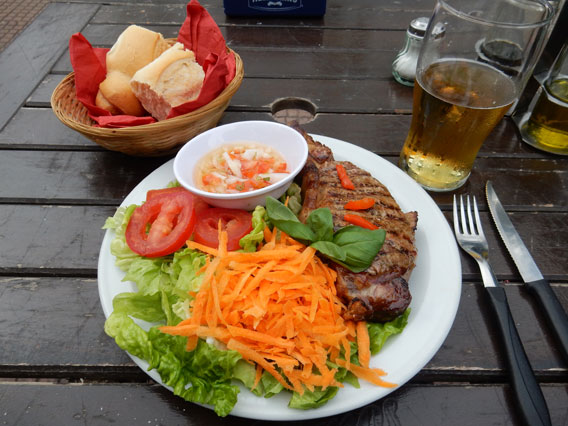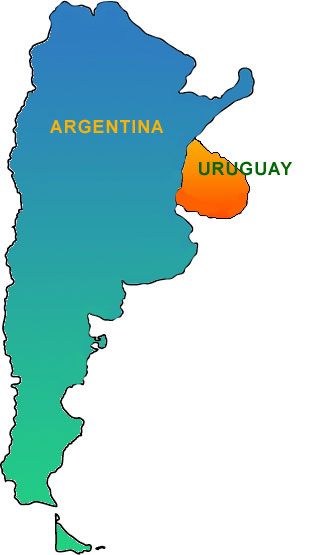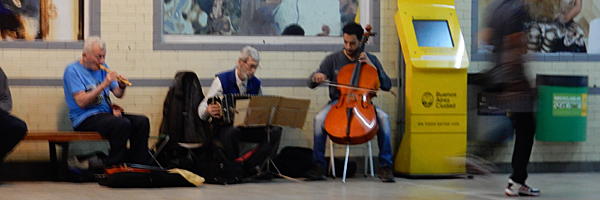A Day Trip Outside the City
Today was a day of organizing, getting information, and of course more exploration. After my morning ritual at Café Dorrego, I set out for a ride on the Subte, taking the C line up to Retiro Station. It was morning rush hour, so the trains were really packed. Hanging onto the bar above me for dear life, surrounded by a crushing mass of humanity, I really began to feel like a porteño, as residents of Buenos Aires are called.
From Retiro Station I walked a few blocks to the Buquebus ferryboat terminal, hoping to catch a boat across the river to Montevideo, the capital city of Uruguay. When I saw the schedule though, I realized it would be better to do this trip the next day and make a whole day of it. If I'm going to go to another country, I want to spend more than just a few hours once I get there.
So I walked back to Retiro Station and caught a train to Tigre, a small town that makes an easy day trip from Buenos Aires. Tigre sits at the mouth of the Paraná River, the great system of waterways that forms a sprawling delta as it pours into the Rio de la Plata. It's about an hour outside of Buenos Aires on a fast modern commuter train that gave me a glimpse of Argentine life beyond the urban core of Buenos Aires.
When the train started up, I imagined that we would be getting out into the open pampas, the endless plains that form such a significant part of Argentina's geography. But once again, the vastness of Buenos Aires made itself abundantly clear. After leaving the wealthy boulevards and highrise business district of Retiro, the train traversed an area of shantytowns, known as villas miserias in Argentine Spanish. These graffiti-covered tenements, held together by duct tape and desperation, stretch out alongside the railroad tracks for many kilometers.
As the train got further from Buenos Aires, the buildings began to get smaller, with more space around them. Single family homes, quiet leafy streets, soccer fields full of exuberant children, these could have been any small middle class suburbs in the U.S.
Arriving in Tigre, I immediately walked down to the river, a picturesque scene of small boats along the languid waterway, lining the wharves of this small town. I wanted to take a boat ride and get a glimpse for myself of the river in all its diversity. The delta of the Paraná River is an incredibly complex network of hundreds of small rivers and waterways interconnecting with each other in a way that must have daunted the early Spanish explorers when they made their first forays upriver in 1536.
I bought a ticket for a one-hour Paseo through the riverine labyrinth, hoping to see the natural world of this enormous estuary. But alas, this was definitely not an "eco-tour." I climbed aboard the small wooden boat with about eight Brazilian tourists and we set out to do a circuit around six rivers within the Paraná delta.
Each of the rivers was wide and deep; these were not mere creeks. The captain seemed to know the area well and at times we came to a point where there were several options to turn, several side rivers that branched out from where we were. This was not a guided tour; the captain sat at the helm, chain-smoking, oblivious to our presence. As he finished each cigarette, he flicked the butt into the filthy waters of the river. I began to feel sad.
The rivers were lined with homes; it was a fairly well populated area—not a wilderness. Some of the homes were once grandiose mansions, many of which have now been turned into clubhouses for rowing crews and sports clubs. One of the houses we passed was the home of a former President of Argentina, Domingo Sarmiento, who lived there from 1855 until his death in 1888. The building is now a museum and National Historic Monument.
The industrial ambiance of the riverways was somewhat depressing. Abandoned and partially sunken boats were mired in the banks of the river. A rusted hulk of a ship languished in a brutal pose with the ironic backdrop of a colorful amusement park rising above it. The pollution was everywhere—I felt a chill of aversion when the water splashed up against my arm.
We returned to the wharf at Tigre and I went back to the train station, catching the next train to Buenos Aires. Back at Retiro Station, I hopped on the Subte, this time taking the C line to Avenida de Mayo, then the A line to Plaza de Mayo. From there I walked down into San Telmo, looking for a good restaurant. I ended up back at Plaza Dorrego, an easy place to find a good steak dinner at any time of day. I found a seat in the plaza, ordered a Bife de Chorizo and a beer, then sat back to watch the tango dancers.

Bife de Chorizo
Today was a day that really gave me a sense of the "informal" economy of Argentina. Like in any country, there are people here living on the margins, trying to make a living in the most desperate of ways. It's a common sight on the Subte—a man or woman comes walking through the train, carefully placing a pack of gum or candy on the knee of each passenger. They recite a small speech as they walk through the train, asking if there might be one person, just one person, who could give them a "monedita, aunque solo es 20 centavos." They then make a second pass through the train, collecting the carefully entrusted bond, hoping to make eye contact and get a payout for their efforts.
On the train to Tigre, the vendors were a little more aggressive. In most cases they were men, with very LOUD voices, who would stop and extol the virtues of their product as if they were starring in a television commercial. Many times they had candy or alfajores (a type of cookie), but usually they had some very odd offerings: computer cables, cough drops, socks.
Sitting in the Plaza Dorrego, the vendors come around constantly. A couple of guys are selling socks. One of the plaza dogs does not like the sock vendors, taking a loud and aggressive stance against them. One of the sock vendors in particular is the target of this dog's wrath and a bizarre comedy ensues as they track each other around the plaza, one clumsy and obsequious, the other snarling and menacing. "Mozo, mozo!" the sock vendor cries out to the waiter, but he garners little sympathy from the staff or the impromptu audience for this theater of the absurd.
The sock vendor finally retreats, leaving the plaza just as my steak dinner is placed in front of me. The plaza dogs now turn their attention to my Bife de Chorizo and I make every effort to evade their hungry glances. I begin to think about my big day tomorrow, my foray into a different world.
| Next up: Another Country |


© 2016 Michael Hanrahan